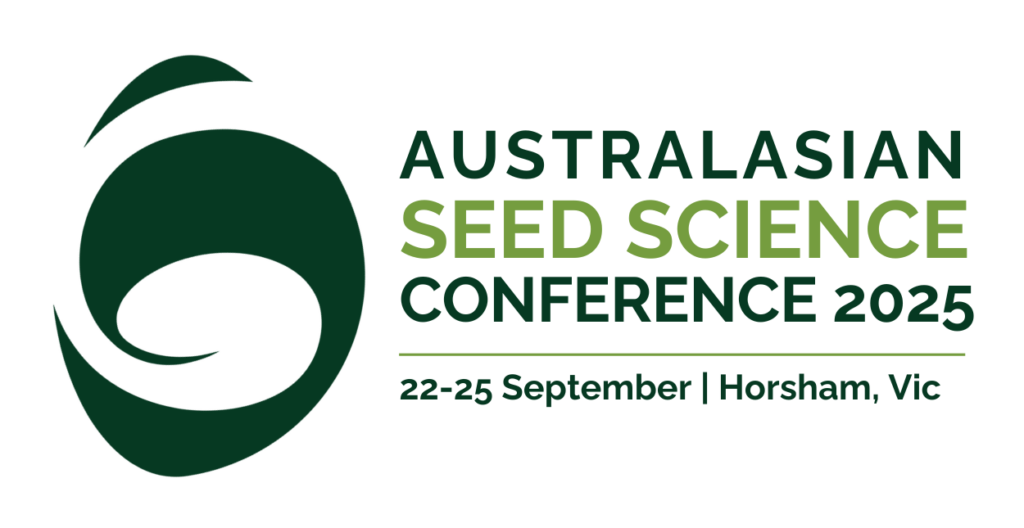
Program
Draft conference program
Our program remains in draft form until mid-July 2025. The schedule and session timings outlined below are current as of 29 May 2025, but are subject to change. Visit this page to stay updated for revisions & adjustments.
18:30 – 20:30: Welcome reception at Barangaroo Boutique Wines
7:30 – 8:30: Registration desk open
8:30 – 9:30: Opening session
- Welcome from the Australian Grains Genebank/Australian Seed Bank Partnership
- Welcome to Country
- Official Conference Opening
Keynote: Celebrating 25 years of the MSBP in the Australasian region and beyond (Dr Aisyah Faruk).
9:30 – 12.35: Plenary Theme – Seeds in culture and Society
Keynote: Indigenous food sovereignty – nation building pathways (Mr Jacob Birch)
- Victorian Traditional Owner Native Food and Botanicals Protocol
- First Nations led enterprises – Dalki Garringa Native Nursery
- IndigiGrow Seeds to Success – Culture and Country
- Negotiating The Regime Complex Of Access And Benefit Sharing Laws And Sustaining Valuable In Situ And Ex Situ Germplasm Collections
- An Ethical Framework To Manage Demand For Seed
- The Australian Plant Breeder’s Rights Act 1994 (cth) And How It Is Used For Australian Native Plants
11:45 – 12:35: Regional perspectives and collaboration on seed banking
- Reinvigorating A National Genebank In Vanuatu For Ex-situ Seed Conservation
- Seed Conservation Of Amorphophallus Titanum (becc.) Becc. Ex Arcang
- Natural Forest Seed Collection For Banking (papua) New Guinea’s Least Explored Tree Species
- Conserving Pollen In A Conventional Seed Bank: A Case Study On A Critically Endangered Hawaiian Species
12:35 – 13:30: Lunch / Mentor & Mentee session (opt in) / Exhibition
13:30 – 17:20: Plenary Theme – Seed sourcing and end use
Keynote: Restoring Nature – What of Sector Capacity, Seed Supply and Motivating People (Dr Paul Gibson-Roy)
- Building Resilience Into Native Seed Supply In A Rapidly Changing World: From Wild Collections To Seed Production
- Increasing Native Grassland Diversity Through A Threatened Species Seed Production Area
- How Big Is Your Seed Orchard? – Practical Issues Of Design, Planning And Management For Successful Seed Production
- Assessing The Genetic Diversity And Representativeness Of Seed Production Areas
- Can Rain Shelters Improve Harvest Yields In Seed Production Areas
- The Search For Seed: Supporting Forest Seed Collection With A High-resolution Predictive Model
- Restoring Ecosystem Climate Resilience (re-clim)
- Strategies For Collection Of Genetically Diverse Germplasm When Seed Availability Is Limiting. A Case Of Critically Endangered Herb, Ballantinia Antipoda
Panel session: The need for seed: tackling native seed supply for our restoration sector
- Empowering Communities And Incentivising Seed Collectors: Addressing Seed Shortages Through Innovative Programs
- Native Seed Supply In South Australia: Challenges, Innovations, And Pathways For Seed-based Restoration
- Establishing Genomic Knowledge Infrastructure To Support Seed Sourcing, Seedbank Management And Seed End Use Strategies
19:00 – 22:00: Conference Dinner at the Maydale Pavilion, Horsham Showground
- 3 course meal showcasing regional produce with 150km of Horsham
- Musical entertainment
- Guest speakers:
- About the 150km feast
- The Conservation Generation: Raising Rarity And Sowing The Seeds Of Wonder
7:30 – 8:25: Registration desk open
8:25 – 8:30: Day opening
8:30 – 12.05: Plenary Theme – Seed Biology and Ecology
- Genetic Variation For Protein Content And Seed Size In Diverse Pulse Germplasm Collections
- Seed Morphological Traits And Its Relationship With Protein And Starch Content Of Diverse Pea Germplasm
- Tracking Evolutionary Changes In Red Clover: A Collaborative Study Between Bosnia And New Zealand
- Using Rna Integrity To Inform The Curation Of Wild Plant Seeds In Conservation Seed Bank
- Challenges And Solutions In Germinating Interspecific Hybrid Seeds And Rare Australian Native Species
- Applied Seed Biology For The Conservation And Restoration Of Western Australia’s Biodiverse Flora
Keynote: What happens when a genome wakes up: Gene regulation during seed germination (Prof Mathew Lewsey)
- Seed Biology Of 12 Fire-affected Subalpine Herb And Shrub Species Raise Concerns Regarding Their Ex Situ Conservation
- The Role Of Snowmelt Timing In Alpine Seed Germination Strategies
- Successful Seed Germination Of Subalpine Phebalium And Leionema (rutaceae) Species
- Seedling Emergence In Grassy Woodlands: Influences Of Microhabitat Conditions
- Differential Responses Of Seeds Of Wild Australian Plant Species Under Open Versus Hermetic Rapid Ageing Conditions
- Effect Of Cold And Smoke Water Pre-treatment On Germination Of 30 Species Of Eucalypt (genera Angophora Cav., Corymbia K. D. Hill & L. A. S. Johnson, And Eucalyptus L’ Hér)
- Variation In Dormancy Characteristics Among 18 Taxa In The Family Rhamnaceae With Contrasting Distributions Across Victoria
Comparing Ex-situ Seed Longevity For 24 Victorian Temperate Grassland Species - Ecophysiology Of Seed Dormancy And Germination Of Hibbertia To Inform Seed Propagation For Ecological Restoration
- Impacts Of Shifting Fire Season On Different Seed Dormancy Types
12:05 – 13:00: Lunch / Exhibition
13:00 – 17.25: Plenary Theme – Seed and Gene Bank Management
Keynote: Understanding seed longevity to improve conservation outcomes (Dr Fiona Hay)
- Towards Smarter Genebank Management: Insights From Genotyping Core Crops In The Australian Grains Genebank
- Unlocking 60 Years Of Historic Observation Data In The Australian Pastures Genebank
- Long-term Longevity Of Orthodox Tree Seed Stored For Decades At Room Temperature ATSC
- Remote And Temporary Seed Banking: Case Studies From The National Seed Bank
- Safeguarding Seed Longevity: Enhancing Efficiency In The Australian Grains Genebank
- How Important Is Your Seed? Experiences With Prioritising Value In A Large Seed Collection
- Developing A Method For Digitally Counting Seeds And Assessing Their Germination Status In Vitro For Seedbank Viability Testing
- Cryopreservation Of Avocado (persea Americana Mill.) And Macadamia (macadamia Spp.) Via Apical Shoot Tips Using Pre-culture And Vitrification Techniques
- The Thermal Behaviour Of Lipids In Short-lived Seeds Of Australian Rainforest Species
- Advancing In Vitro Conservation Of Subtropical Australian Myrtaceae
- The Role Of Nutrition In Cryopreservation Of Australian Myrtaceae
Panel session: Challenges and opportunities for our sectors inc. next gen perspectives
- Australian Grains Genebank – Next-gen Genebank Management For A Food Secure Future
- Seed Germination Re-testing To Assess ‘real Time’ Longevity In Storage: A Six-year Progress Report From The National Seed Bank
- Data consistency and curation is key to maximise the value of conservation seed banks: learnings from the review of Australia’s 2000-2020 seed bank programs
17:25 – 18:25: Poster Session and Mocktails
19:00 – Late: Early Middle Career Researcher and Practitioner social event
8:00 – 10:00
- Field tour 1 – Tour of Dalki Garringa Native Nursery (TBC)
11:00 – 13:00 choice of one concurrent workshop
14:00 – 14:30
14:30 – 17:30
|
|
Conference themes
The theme for this year’s conference is “Seeding Connection: Bridging knowledge, policy and practice across Agriculture and Conservation”.
Our conference will centre around four themes that have been designed to capture the international, national and regional knowledge across seed science research, policy, management practice, and use of genetic resources that encapsulate the impacts of climate change, technological advancements, legal frameworks, and partnerships for agricultural and environmental sustainability. These themes are:
- Seeds in culture and society
Exploring Indigenous perspectives, initiatives and enterprises; collaboration through partnerships; and protocols, legal frameworks and policies related to the conservation, restoration, collection, distribution and use of native biodiversity for food, agriculture, forestry and other sectors. - Seed sourcing and end use
Exploring what factors affect seed sourcing and supply, and how advances in technologies and targeted strategies can maximise genetic diversity and guide applications in biodiversity conservation, restoration and grain crop production. - Seed biology and ecology
Exploring research, including the use of technologies, that provide insights into genetic diversity, seed storage behaviour, germination strategies and biological function of genetic resources to better understand seed ecology, seed microbiome, ‘difficult to germinate’ species, plant population dynamics and adaptation to advance agricultural productivity, restoration and conservation sectors. - Seed and gene bank management
Exploring how innovations, genomic and digital technologies, and data systems, methods and practices are being used to bank orthodox and non-orthodox taxa, improve seed quality and longevity, understand genetic diversity, and increase the utility of international, national and community gene banks for biodiversity conservation, agricultural crop improvement, and forestry applications.
Meet your Keynote Speakers
Dr Aisyah Faruk
Opening session
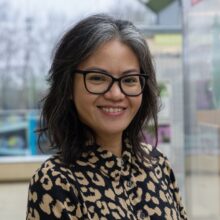
Aisyah has extensive experience in tropical conservation, completing her PhD on Biological Sciences, investigating the impact of mono-cultures on biodiversity in Malaysia. Aisyah has worked for over 10 years in the International Seed Conservation Team at the Royal Botanic Gardens, Kew, initially as the coordinator for partnerships in the Caucasus (Georgia, Armenia and Azerbaijan) and the Arabian Peninsula regions and since 2020 as the Conservation Partnerships Coordinator for Europe and Oceania. Aisyah coordinates projects throughout Australia, the Pacific, Europe and the Middle East. involving collection and conservation of seeds, collaborative research on endemic and highly threatened/rare flora and the sustainable use of important wild harvested plants. The Royal Botanic Gardens, Kew is generously supporting the attendance of Dr Aisyah Frank.
Mr Jacob Birch
Seeds in culture and society
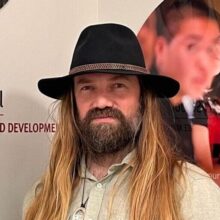
Jacob Birch is a Gamilaraay man living and working on the Sunshine Coast, Queensland. An academic; entrepreneur; and advocate for Indigenous food sovereignty, Jacob is particularly passionate about Australian native grains and all the intrinsic benefits they carry. This has led him to work across disparate spaces as he takes a systems approach to use the reawakening of native grain foodways as a nation building opportunity. Jacob recently returned from North America where he was connecting with leaders in the Indigenous food sovereignty movement and gaining insight into the positive cascading effects that come from empowered Indigenous communities.
Jacob hopes to inspire Indigenous communities in Australia about the opportunities for healing, economic development, and self-governance that can be scaffolded around efforts to become food sovereign and food secure. The Council of Heads of Australian Botanic Gardens is generously supporting the attendance of Mr Jacon Birch.
Dr Paul Gibson-Roy
Seeds sourcing and end use
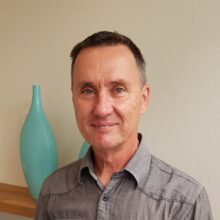
A leading restoration ecologist, Dr. Gibson-Roy specialises in grassland and grassy woodland communities, working across universities, NGOs, governments, and private sectors to champion the protection and restoration of these vital ecosystems. His research and hands-on restoration work have played a significant role in conserving native grasslands and woodlands, which are key habitats that support biodiversity and essential ecosystem services.
Through his decades of expertise, Dr. Gibson-Roy has bridged the gap between research and practice, advocating for sustainable land management and large-scale habitat restoration. His insights are invaluable for anyone passionate about ecological conservation, restoration, and the future of our landscapes. The NSW Department of Climate Change, Energy, the Environment and Water is generously supporting the attendance of Dr Gibson-Roy.
Prof Mathew G. Lewsey
Seed biology and ecology

Professor Lewsey’s research delves into how gene expression influences plant function, with his lab at the La Trobe Institute for Sustainable Agriculture and Food bringing together genome scientists, engineers, computational biologists, and more.
His work bridges fundamental science and applied research, including how we can adapt plants for growth in space. With a career spanning top international research institutes (including the University of Cambridge, the Salk Institute, and the Centro Nacional de Biotecnología) Professor Lewsey is at the forefront of plant genetics and its future applications.
Dr Fiona Hay
Seed and gene bank management
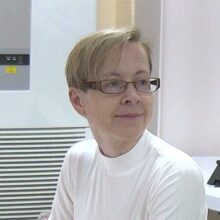
With over 30 years of experience in seed conservation research, Dr. Hay’s career has spanned some of the world’s most renowned seed conservation institutions, including the Royal Botanic Gardens Kew, the International Rice Research Institute, and now Aarhus University in Denmark. She continues to collaborate with international genebanks to advance seed science globally.
Dr. Hay’s research focuses on seed longevity, investigating the best times to harvest seeds, optimal drying techniques, and how longevity varies between and within species. Her work is fundamental to securing plant diversity for the future. As Chief Editor of Seed Science and Technology and President-Elect of the International Society for Seed Science, she is at the forefront of global seed research. The International Plant Phenotyping Network is generously sponsoring the attendance of Dr Hay

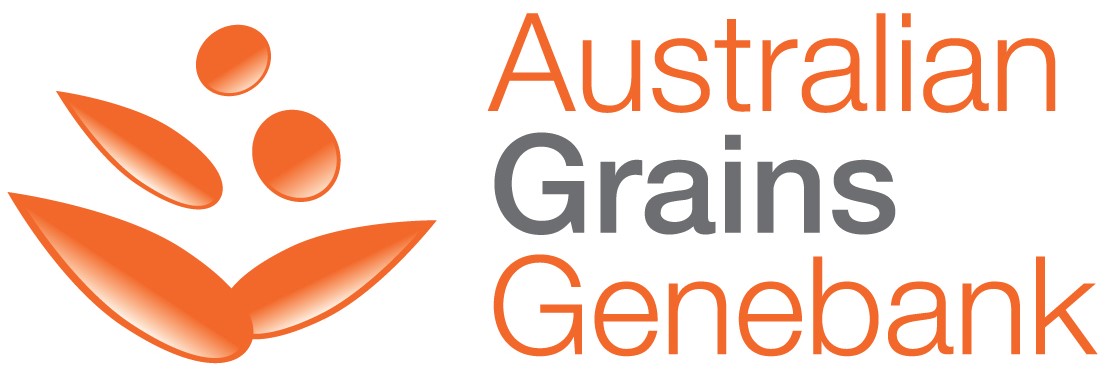

Key Dates
Early Bird Registration close
30 June 2025
Speaker Notification
End May 2025
Program available
June 2025
Contact Us
Registration enquiries
[email protected]
Program & general enquiries
[email protected]
Conference
Hosts
Australian Grains Genebank
&
Australian Seed Bank Partnership
Conference organisers
Arinex Pty Ltd
